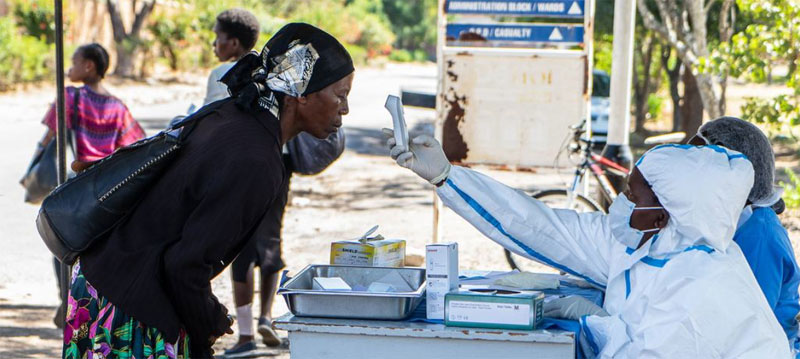 Pandemic
Pandemic
UN chief: ‘We cannot defeat a pandemic in an uncoordinated way’
Arguing that the world “cannot defeat a pandemic in an uncoordinated way”, the UN Secretary-General said on Thursday that countries “must take concrete action in the coming days” to vaccinate 40 per cent of the world’s population by the end of the year.
Speaking to journalists in New York, António Guterres also asked Member States to be “far more ambitious” in their efforts to reach 70 per cent of people in all countries by the middle of 2022, a goal established by the World Health Organization (WHO).
Just days from the deadline, 98 countries have not been able to meet that end-of-year target, and 40 nations have not yet even been able to vaccinate 10 per cent of their population. In lower-income countries, less than 4 per cent of the population is immunized.
‘Free pass’ for variants
“Vaccine inequity is giving variants a free pass to run wild - ravaging the health of people and economies in every corner of the globe”, Mr. Guterres said.
According to WHO, the vaccination rates in high-income countries are 8 times higher than in the countries of Africa. At current rates, the continent will not meet the 70 per cent threshold until August 2024.
Because of all that, the Secretary-General believes that “COVID-19 is not going away.”
“It is becoming clear that vaccines alone will not eradicate the pandemic. Vaccines are averting hospitalization and death for the majority who get them and slowing the spread. But transmissions show no sign of letting up. This is driven by vaccine inequity, hesitancy and complacency.”
‘A difficult year’
In his last press conference of the year in New York, Mr. Guterres said the world was “coming to the end of a difficult year”.
In 2021, he pointed out, the pandemic still raged, inequalities kept rising, the burden for developing countries grew heavier and the climate crisis remained unresolved.
“I am deeply worried. If things do not improve – and improve fast – we face even harder times ahead”, the Un chief warned.
Guterres also denounced “lopsided” recovery efforts, that are accelerating inequalities and increasing stresses on economies and societies.
In fact, he recalled, advanced economies mobilized nearly 28 per cent of their Gross Domestic Product into economic recovery. For middle-income countries, the number fell to 6.5 per cent, and it plummeted to 1.8 per cent for the least developed countries.
Read here about UN’s comprehensive response to the COVID-19 pandemic.
Global finance system ‘supercharging inequalities’
The Secretary-General highlighted projections from the International Monetary Fund (IMF) showing that cumulative economic growth per capita over the next five years in Sub-Saharan Africa will be 75 per cent less than the rest of the world.
With inflation rising to a 40-year high in the United States and growing elsewhere, Mr. Guterres expects interest rates to rise, placing greater fiscal constraints on the least developed countries.
“Defaults will become inevitable for lower income countries that already bear much higher borrowing costs”, he said. “Today’s global financial system is supercharging inequalities and instability.”
As a result, inequalities keep widening, social upheaval and polarization keep growing and the risks keep increasing.
For Mr. Guterres, “this is a powder keg for social unrest and instability” and poses “a clear and present danger to democratic institutions.”
Countries in Africa have accessed vaccines through the COVAX Facility., by WHO
Because of that, he argued, “it is time to clearly assume the need for reform of the international financial system.”
‘Moral failures’
Speaking about the response to the pandemic and the international financial system, the Secretary-General argued that they reveal governance failures that are also moral failures.
“I am determined that 2022 must be the year in which we finally address the deficits in both governance systems”, he said.
The Secretary-General is sure that the world knows “how to make 2022 a happier and more hopeful new year” but said that everyone “must do all it takes to make it happen.”
Finally, the UN chief mentioned his last visit of the year, that will take him this Saturday to Lebanon, a country “that is in the grip of all these challenges and worse.”
Support Our Journalism
We cannot do without you.. your contribution supports unbiased journalism
IBNS is not driven by any ism- not wokeism, not racism, not skewed secularism, not hyper right-wing or left liberal ideals, nor by any hardline religious beliefs or hyper nationalism. We want to serve you good old objective news, as they are. We do not judge or preach. We let people decide for themselves. We only try to present factual and well-sourced news.







